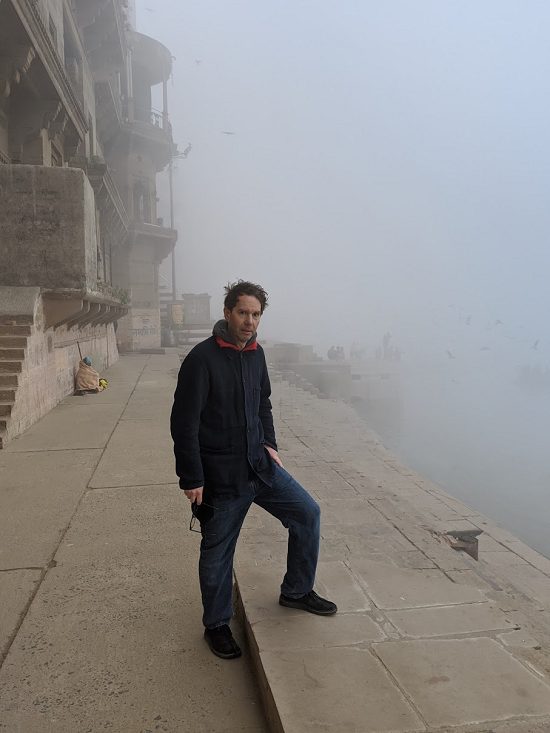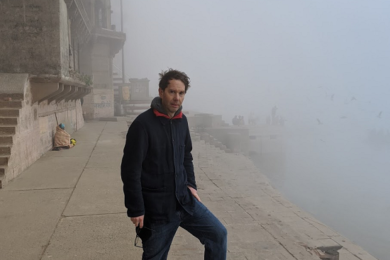In his book, Retreat: How The Counterculture Invented Wellness, writer, musician and blogger Matthew Ingram, aka Woebot, connects the dots between beats, yoga, meditation, psychedelics, psychoanalysis, Eastern philosophy, sex and veganism, giving us a less-explored account of how the counterculture of the sixties and seventies finds new relevance in our modern obsessions with health and wellness.
Describing it as “an account of what happened in the history of counterculture,” Ingram fills a void in discussions about the subject, and beyond that provides a blueprint for other unexplored perspectives – most importantly the lack of female representation – with his faithful account of ideas have crossed geographical boundaries.
When lines of culture are blurred, problems such as perceived cultural appropriation become common. However, Ingram takes a long-range view, believing that if explored with respect, these ideas only serve to help us learn about and understand each other better. As such, he believes that despite the climate in which we live, the boundlessness of artforms like music will remain, thus continuing to encourage counterculture.
In conversation with tQ, he delves into what first sparked his interest in counterculture, the discoveries he made during his research, expands on the above and more. He also hints at what’s to come from the different ideas that piqued his interest, leaving the floor open for further reinventions and taking into account the voices who remain unaddressed. Ingram will also appear at Unsound Festival in Krakow this Wednesday, October 13, in conversation with tQ’s John Doran. You can find out more about the appearance, which will also be livestreamed, here.
tQ: What first sparked your interest in counterculture, and how did you connect it with wellness and health?
Matthew Ingram: It was an accumulation of things. Previously I’d made a film about Vitamin C so I was already thinking about health. But then it was seeing bits of counterculture and picking them up one by one – The Beatles’ interest in transcendental meditation, the association between macrobiotics, food and hippies, LSD research and its connection with psychiatry which I read about in a book called Storming Heaven by Jay Stevens. I kept picking these things one by one, and realized that all these things that come out of counterculture, and were related to health in one way or another.
In researching all the different aspects of culture and counterculture across the globe, what did you discover that you didn’t know prior to writing this book?
I didn’t really appreciate how important the fascination with Eastern culture and religion was to counterculture. The ideas were much more deeply embedded in the culture than I was aware of. For instance, macrobiotics; the name has a neutral Western sound, the term itself comes from the research of German scholar and researcher Christophe Wilhelm Von Hufeland. But the concept itself was Japanese, which came about as a reaction to the Westernization of Japan. So, I think the big realisation was how these ideas from places like India and Japan were shared in the West. It wasn’t a one-way street, it wasn’t theft or cultural appropriation – it was just brilliant, very ambitious people coming from the East, sharing their teachings in the West.
It’s interesting you mention cultural appropriation, do you think that’s misunderstood regarding counterculture, especially when it comes to the more entertainment-based artforms like music?
I think it depends on how it’s done, and it needs to be done with respect. The text I always go back to is Edward Said’s Orientalism, where he makes the distinction between, on the one hand "an economic study of long-term Soviet energy potential and its effect on military capability" versus "a study of Tolstoy’s early fiction financed in part by a foundation." Here there’s a distinction in the different approaches to cultural appropriation. In my experiences of travelling, I saw some nations appropriating and using Western culture for their own means. I’ve never seen it as being a focus for criticism, especially when looking back into things like the continuum of religious thought around the Silk Road from Daoism, Vedanta, Zen Buddhism, Buddhism, has no particular focal point and flows through. Geographically, Buddhism is as close to Greece as it is to Japan, a lot of the Vedanta comes from Greek thought as well. Personally, I take a long-range view of cultural appropriation where if people are interested and they treat the ideas with respect, that should be enough. But that’s obviously not the climate we live in.
So, given the current climate and approach to cultural appropriation, do you believe counterculture will continue to exist particularly through music?
I’d like to think of music as an open forum for exchange of cultures and ideas. When I used to write about music there was always one analogy that I always liked: “Every village along the Rhine can understand the village beside it.” Music is a boundary-less form and that should be celebrated, because purity in music makes it quite boring. I’ve always seen the argument around hardcore jungle which is the most hybridized music imaginable, or how minimalism shows how you can take Far Eastern music and turn into something authentically European or American in a way that respects and understands the principles behind it. So, I hope that people will continue to their cultures and learn from each other – it shouldn’t be shut off.
Counterculture does seem to be very male-centric, did this ever come in the interviews you had done?
One of the interviewees, Joseph Burke, talked about dialectics, how it was all about the “bros,” and there wasn’t any representation of women. Another interviewee, Germaine Greer, mentioned in the book about how she was sidelined and abused by the men at Suck magazine. There were bits of the topic in there, but it wasn’t the question I was asking. I was looking for what did happen in counterculture, rather than what didn’t happen. So, there is an aspect to the culture that’s very ‘laddy’ and there’s quite bad treatment of women. I’d be keen to read another book – if any tackled the subject- that took a different perspective and tried to re-understand the era from the point of view of women. One of the things about coming into a new territory, is that the role of the first wave of research is to faithful to the conditions as they were. This book isn’t a reinvention of counterculture, and there’s a room for other people to offer fresh takes and highlight voices that weren’t addressed.
You’ve done a lot of interviews around the book and its themes, but is there something you haven’t had the chance to discuss or haven’t been asked that you’d like to?
It’s been nearly five years of researching and reading, I’ve just kept going. What I’ve found interesting is the areas of research that have led out from it. For the book, I tried to keep things focused on health and counterculture but I did subsequently make a huge pile of the areas within counterculture that I found interesting. The work I’m starting now is a graphic novel came out of my research around ESP, a theme that interests and amuses me, my next book goes into that.
Matthew Ingram will be appearing at this year’s Unsound Festival in Krakow on October 13. His appearance, titled ‘Well, Actually… Wellness, Psychedelics And Neoliberalism’, will see him in conversation with tQ’s John Doran, and will also be livestreamed. You can find the full details here.



